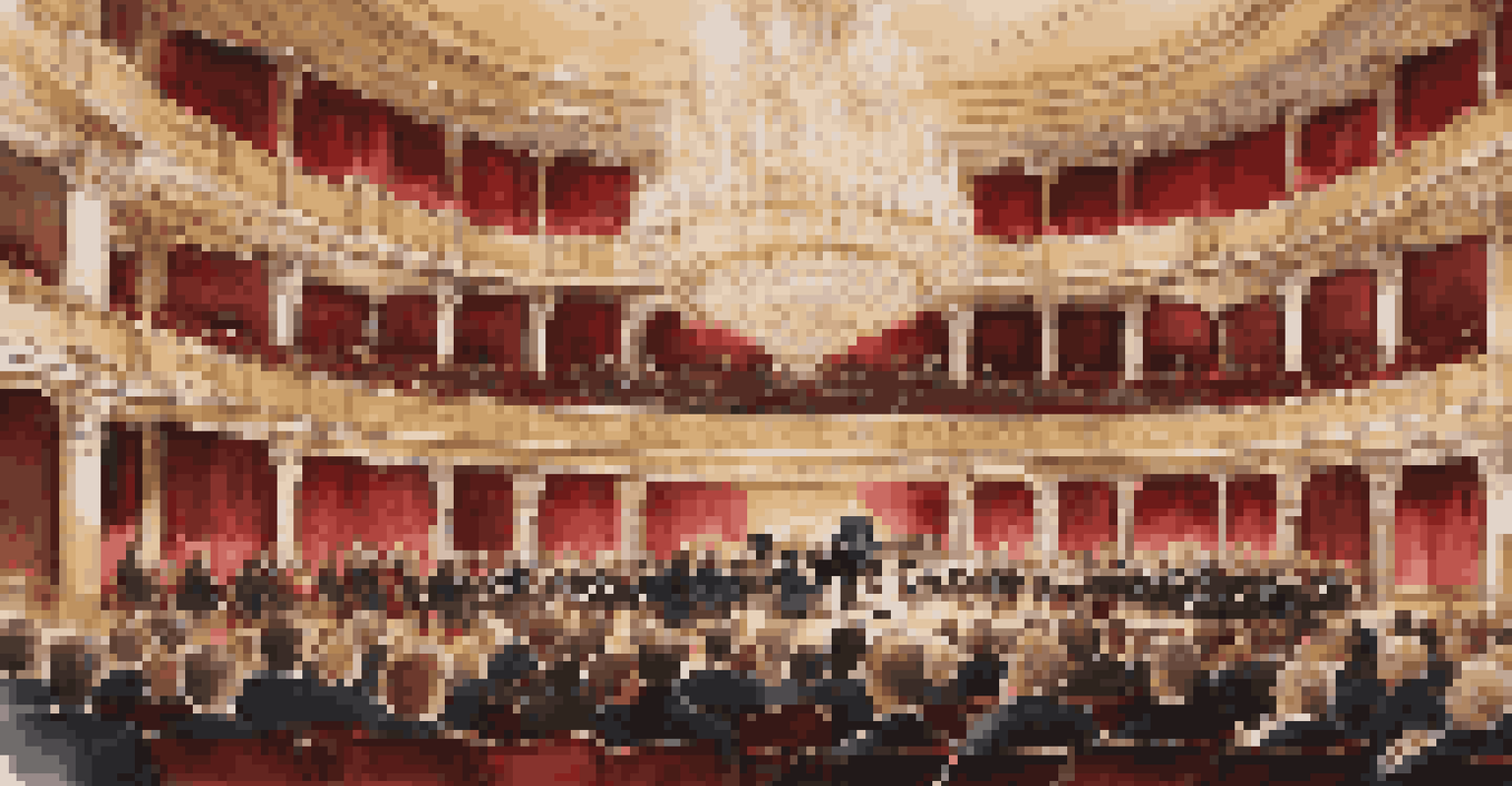Exploring the Spiritual Dimensions of Classical Music

The Intersection of Music and Spirituality
Classical music often transcends mere entertainment, inviting listeners to explore deeper emotional and spiritual realms. This genre, rich in history and complexity, has been a medium for expressing the ineffable. The emotional gravity found in compositions can evoke feelings of peace, nostalgia, or even transcendence, illustrating music's role as a bridge to the divine.
Music is the shorthand of emotion.
Many composers, like Bach and Beethoven, infused their works with spiritual significance, reflecting their beliefs and experiences. For instance, Bach's 'Mass in B Minor' is not just a musical piece; it's a profound declaration of faith, where every note resonates with devotion. This intentionality creates a unique space for listeners to connect with something greater than themselves.
This intersection of music and spirituality invites us to consider how melodies can echo our innermost thoughts and feelings. Just as a prayer or meditation can center the mind, immersing oneself in classical music can provide a similar sense of solace and reflection. Ultimately, it highlights the universal quest for meaning and connection that music uniquely fulfills.
Emotional Resonance in Classical Compositions
One of the most striking aspects of classical music is its ability to evoke deep emotions. Composers like Tchaikovsky and Mahler skillfully crafted pieces that resonate with the human experience, touching on themes of love, loss, and longing. For example, Tchaikovsky’s 'Swan Lake' conveys a profound sense of tragedy and beauty, engaging listeners on an emotional level that often feels spiritual.

This emotional resonance can be likened to a shared language that transcends words. Just as a poet uses imagery to convey feelings, a composer uses notes and harmonies to express what words often cannot. This is why many find solace in classical music during times of grief or celebration, as it reflects and amplifies our internal states.
Music as a Spiritual Bridge
Classical music transcends entertainment, allowing listeners to connect with deeper emotional and spiritual realms.
Moreover, the emotional journey through classical music often leads to moments of reflection and introspection. Whether it's the uplifting strains of a symphony or the haunting melodies of a concerto, these compositions invite listeners to explore their own feelings and experiences. In doing so, music becomes a transformative experience, allowing for personal and spiritual growth.
The Role of Nature in Classical Music
Nature has long been a muse for classical composers, inspiring works that echo the beauty and complexity of the natural world. From Vivaldi's 'Four Seasons' to Debussy's 'Clair de Lune', these pieces reflect the awe and spirituality found in nature. Each note can evoke imagery of landscapes, weather, and the changing seasons, enhancing our connection to the earth.
The music is not in the notes, but in the silence between.
This connection to nature can create a meditative quality in music, encouraging listeners to pause and reflect. The gentle flow of a river or the rustle of leaves can be mirrored in melodic lines, inviting us to experience the world around us more profoundly. In this way, classical music becomes a channel for spiritual connection to nature, fostering a sense of peace and grounding.
Furthermore, the rhythms and patterns found in nature often find their way into classical compositions, creating a harmonious blend between the two. This relationship emphasizes the interconnectedness of all things, reminding us that music, like nature, has the power to heal and uplift. It's a beautiful reminder of the spiritual dimensions that music can embody.
Sacred Music and Its Spiritual Legacy
Sacred music has played a pivotal role in the spiritual dimensions of classical music, often serving as a means to express devotion. Works like Mozart's 'Requiem' and Handel's 'Messiah' are not just performances; they are profound spiritual experiences that invite listeners into a sacred space. These compositions often reflect the gravitas of faith and the human condition, intertwining music and spirituality.
The rituals surrounding sacred music, such as church services or spiritual gatherings, further enhance its significance. When performed in these settings, the music transcends the ordinary, creating an atmosphere ripe for contemplation and connection. Listeners often feel a sense of unity, sharing in the collective experience of worship and reflection.
Nature's Influence on Composition
Many classical pieces reflect the beauty of nature, enhancing our spiritual connection to the world around us.
Moreover, the legacy of sacred music continues to influence modern compositions, where themes of spirituality are woven into the fabric of classical music. Many contemporary composers draw inspiration from sacred traditions, demonstrating that the quest for meaning through music is timeless. This ongoing dialogue between past and present reinforces our understanding of music as a spiritual journey.
The Meditative Power of Classical Music
Many people turn to classical music for its calming and meditative qualities, finding solace in its intricate melodies and harmonies. The slow, tranquil movements of pieces by composers like Erik Satie or Philip Glass can create a serene environment, inviting listeners to slow down and breathe. This meditative experience often leads to a deeper sense of awareness and presence.
Listening to classical music can serve as a form of mindfulness, allowing individuals to connect with their thoughts and feelings. Just as meditation encourages focus on the breath, immersing oneself in the soothing sounds of a symphony can anchor the mind. This practice not only enhances relaxation but also opens the door to spiritual exploration.
Additionally, the repetitive patterns and structures found in classical music can lead to a state of flow, where time seems to dissolve. This experience can bring about moments of clarity and insight, echoing the spiritual revelations often sought through meditation. By harnessing the meditative power of classical music, individuals can embark on their own journeys of self-discovery and spiritual awakening.
Cultural Influences on Spiritual Music
Classical music is deeply intertwined with various cultural traditions, each adding layers of meaning to its spiritual dimensions. From Eastern influences seen in composers like Debussy to the rich religious heritage of Western classical music, these cultural nuances shape how we interpret and experience spirituality through music. Each culture brings its own unique perspective on life, death, and the divine, reflected in their musical expressions.
For example, the use of gamelan music in some classical compositions introduces listeners to the spiritual philosophies of Indonesia. This blending of cultures exemplifies how music can serve as a universal language, transcending boundaries and fostering a sense of global connection. It reminds us that spirituality is not confined to one tradition but is a shared human experience.
Personal Connections to Music
Each listener's journey through classical music is unique, often leading to profound moments of spiritual insight and reflection.
Ultimately, these cultural influences enrich our understanding of classical music as a spiritual journey. By exploring the diverse backgrounds of composers and their works, we gain insight into the myriad ways music can express the human quest for meaning. This exploration invites us to appreciate the beauty of diversity within the spiritual tapestry of classical music.
The Personal Journey Through Classical Music
Every listener's journey through classical music is personal and unique, shaped by individual experiences and emotions. This deeply personal connection can lead to moments of profound spiritual insight, as music often resonates with our own life stories. Whether it’s a piece that evokes cherished memories or one that speaks to current struggles, classical music provides a canvas for our spiritual reflections.
For many, attending a live performance can be especially transformative. The energy of the audience, the skill of the musicians, and the acoustic environment all contribute to an immersive experience that can feel almost sacred. In these moments, listeners may find themselves swept away, connecting with the music and their own emotions on a deeper level.

Moreover, as we navigate our spiritual journeys, classical music can serve as a companion, guiding us through various phases of life. The way a particular composition resonates with us can shift over time, reflecting our growth and changing perspectives. In essence, classical music becomes a mirror, reflecting our inner landscapes as we seek meaning and connection in our lives.